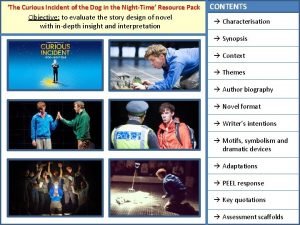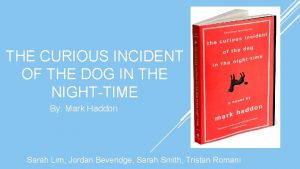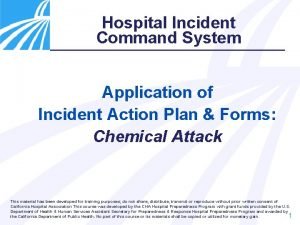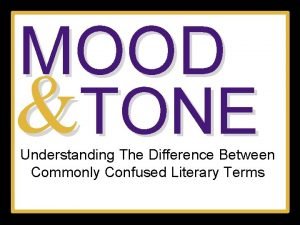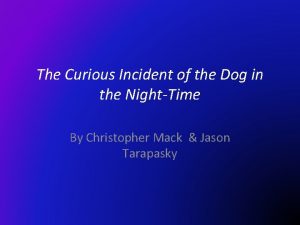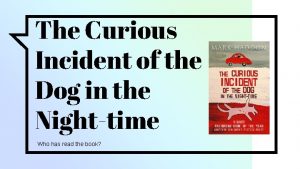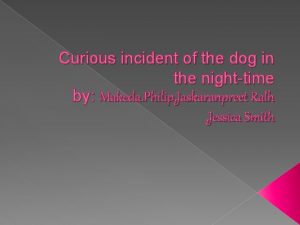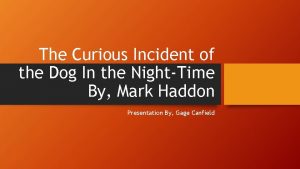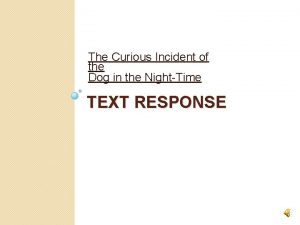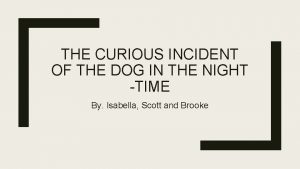The Curious Incident of the Dog in the
















- Slides: 16

The Curious Incident of the Dog in the Night-Time Driving Question: What impact does abuse have on a child as they’re growing up? Written By: Mark Haddon By: Ryan Wu, Kevin Kim, Filip

Driving Question: What impact does abuse have on a child as they are growing up?

When children are exposed to abuse, it may affect behaviour, personality, or even the family itself. They can witness abuse, hear, observe, and even experience the tension between the family. If they are subject to abuse they might never feel safe at home. They might become frightened anxious, because they don’t understand why it is happening.

Most children that suffer from abuse keep it a secret, they might look fine to others on the outside but inside, they are in stress and pain. Children might also feel isolated and vulnerable, they go through a lot of emotions, and might even feel abandoned.

Even if the child isn’t physically abused, they could be suffering from emotional or psychological shock or trauma. Children who grow up being subject to abuse or witnessing abuse are more likely to carry on the abuse to their own relationship or families because they were denied a healthy family environment while growing up. Some studies show that children raised in abusive homes have a bigger chance of using violence in order to solve conflicts or problems they encounter.

Children from abusive or violent family environments also have a bigger chance of alcohol and substance abuse, post traumatic stress disorder, juvenile offending. Abuse is also the number one reason for why children run away from their homes.

Emotional Abuse: acts that are meant to cause emotional pain, possibly resulting in psychological trauma, chronic depression, post-traumatic stress disorder and/or anxiety. e. g. -stalking -rejecting -isolating -ignoring -humiliating -nervousness around certain people -unusual behaviour often related to dementia (e. g. sucking, biting, rocking)

Physical Abuse: acts that are meant to cause any forms of physical harm to another person intentionally. e. g. -hitting someone (slapping, kicking, etc. ) -signs include bruises, black eyes, lacerations, broken bones, cuts, punctures, rope marks, broken eyeglasses/frames.

Verbal Abuse: intentional acts that are meant to hurt someone through saying hurtful things. e. g. threatening swearing yelling

Comparison: Physical Abuse - abuse through physical actions that are meant to be harmful Emotional Abuse - a form of abuse meant to harm someone psychologically and emotionally Verbal Abuse - hurting people verbally using negative or hurtful comments After assessing these different varieties of abuse, we have concluded that the most harmful form of abuse is physical abuse. We think that physical abuse is the most harmful form of abuse because this means a person is getting beat or hit constantly and it’s just as emotionally painful as the other two forms of abuse except this one is more painful physically and emotionally.

Different Types of Abuse

Emotional Abuse/Verbal Abuse Non-physical actions like. threats, insults, constant monitoring or “checking in, ” excessive texting, humiliation, intimidation or isolation. Domestic violence and abuse can happen to anyone, yet the problem is often overlooked, excused, or denied. This is especially true when the abuse is psychological, rather than physical. Noticing and acknowledging the signs of an abusive relationship is the first step to ending it. No one should live in fear of the person they love.

Physical Abuse Any use of physical force with the intent to cause fear or injury, like hitting, shoving, biting, strangling, kicking or using a weapon. Physical abuse that is perpetrated by spouses or intimate partners in order to gain power and control over the victim is described in the section on domestic violence.

Sexual Abuse Any action that prevents a person's ability to control their sexual activity or the in which sexual activity occurs, including restricting access to birth control or condoms. Ignoring someone's refusal to engage in sexual activities by repeatedly using emotional, verbal or physical pressure.

Digital Abuse The use of technology such as texting and social networking to bully, harass, stalk or intimidate a partner. Often this behavior is a form of verbal or emotional abuse perpetrated through technology.

Works Cited: "Why The Impact of Child Abuse Extends Well Into Adulthood. " Why The Impact of Child Abuse Extends Well Into Adulthood. 1 Jan. 1991. <http: //www. psychologytoday. com/blog/the-new-resilience/201310/why-the-impact-child-abuse-extends-welladulthood>. "Effects of Domestic Violence on Children. 2008. <http: //www. domesticviolenceroundtable. org/effect-on-children. html>. "Impact of Child Abuse & Neglect. " Impact of Child Abuse & Neglect. <https: //www. childwelfare. gov/can/impact/> "Why The Impact of Child Abuse Extends Well Into Adulthood. " Why The Impact of Child Abuse Extends Well Into Adulthood. 1 Jan. 1991. <http: //www. psychologytoday. com/blog/the-new-resilience/201310/why-the-impact-child-abuseextends-well-adulthood>.
 The curious incident of the dog in the nighttime genre
The curious incident of the dog in the nighttime genre The curious incident of the dog in the nighttime synopsis
The curious incident of the dog in the nighttime synopsis The curious incident of the dog in the nighttime
The curious incident of the dog in the nighttime The curious incident of the dog in the nighttime symbols
The curious incident of the dog in the nighttime symbols Christopher boone characterization
Christopher boone characterization Wellington the curious incident
Wellington the curious incident Incident objectives that drive incident operations
Incident objectives that drive incident operations Complement pronouns
Complement pronouns The curious case of the carbon copy kitty
The curious case of the carbon copy kitty Abc final exam practice test
Abc final exam practice test Mood in literature
Mood in literature Themes in the curious case of benjamin button
Themes in the curious case of benjamin button Curious george gets a talker
Curious george gets a talker At the peace table cartoon
At the peace table cartoon Curious minds want to know
Curious minds want to know Curious cove camp
Curious cove camp Curious george washington
Curious george washington

